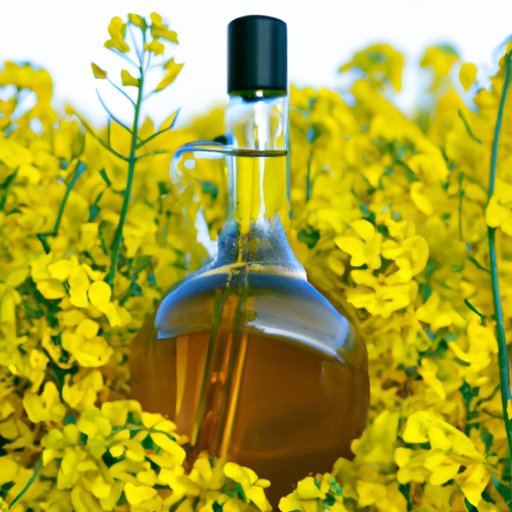Introduction
Rapeseed oil has become a popular cooking oil in recent years, widely used in both home and restaurant kitchens. But what makes it so appealing? And is it actually healthy? In this article, we’ll explore the nutritional benefits, potential risks, and environmental impact of using rapeseed oil, as well as a comparison to other cooking oils.

Nutritional Benefits of Rapeseed Oil
Rapeseed oil is a vegetable oil derived from the seeds of the rapeseed plant (Brassica napus L.), which is in the same family as cabbage, kale, and broccoli. It’s often referred to by its more common name, canola oil. Rapeseed oil is a light, neutral-flavored oil that is high in monounsaturated fats and Omega-3 fatty acids, making it an attractive option for those looking to improve their overall health and reduce their risk of heart disease.
Rapeseed oil is also packed with vitamins and minerals, including Vitamin E, Vitamin K, and magnesium. It also contains essential fatty acids such as linoleic acid and alpha-linolenic acid, which are important for maintaining a healthy body. Additionally, rapeseed oil is low in saturated fat and contains no trans fats, making it a healthier alternative to other cooking oils.
The health benefits associated with the use of rapeseed oil include improved cardiovascular health, lower cholesterol levels, better blood sugar control, reduced inflammation, and improved digestive health. Studies have also shown that rapeseed oil may help protect against certain types of cancers, such as breast cancer.
Exploring the Potential Health Risks of Rapeseed Oil
While there are many potential health benefits associated with the use of rapeseed oil, there are also some potential health risks to consider. The most significant concern is the high level of omega-6 fatty acids found in rapeseed oil. While omega-6 fatty acids are essential for health, too much of them can lead to inflammation and other health issues. It’s important to note that not all omega-6 fatty acids are equal; some are beneficial while others can be harmful.
Additionally, some people may be allergic to rapeseed oil or other ingredients in the oil. If you experience any adverse reactions after consuming rapeseed oil, it’s important to consult your doctor or allergist.
A Comparison of Rapeseed Oil vs. Other Cooking Oils
When it comes to choosing a cooking oil, it’s important to understand the nutritional profile of each type of oil. Olive oil, for example, is high in monounsaturated fats and antioxidants, but it also contains a small amount of saturated fat. Coconut oil is high in saturated fat and medium chain triglycerides, which can help to boost metabolism and energy levels. Vegetable oil is high in polyunsaturated fats, which can help to lower cholesterol levels, but it also contains trans fats.
Each type of oil has its own pros and cons, so it’s important to do your research and choose the best option for your individual needs. For those looking for a healthy cooking oil with a neutral flavor, rapeseed oil is a great choice.

How to Use Rapeseed Oil in Everyday Cooking
Rapeseed oil can be used in a variety of ways in everyday cooking. It’s great for sautéing vegetables or stir-frying, and it can also be used to dress salads or marinate meats. It’s important to note that rapeseed oil has a low smoke point, so it’s not recommended for deep-frying or high-heat cooking. It’s also important to store rapeseed oil in a cool, dark place and avoid reheating it multiple times.
The History and Popularity of Rapeseed Oil
Rapeseed oil has been around for centuries and was originally used as a lamp oil and lubricant. It wasn’t until the mid-20th century that it began to be used as a cooking oil. Over the past few decades, its popularity has grown significantly due to its health benefits and its neutral flavor. Today, rapeseed oil is a staple in many kitchens and is used in a variety of dishes.

Environmental Impact of Rapeseed Oil Production
As with any type of food production, there are environmental impacts associated with the production of rapeseed oil. The use of pesticides and fertilizers can lead to increased water pollution and soil erosion. Additionally, the production of rapeseed oil requires a large amount of energy, which can result in increased greenhouse gas emissions.
It’s important to be aware of the environmental impact of any product you purchase, and to look for companies that use sustainable practices when producing their products.
Conclusion
Rapeseed oil is a healthy and versatile cooking oil that has become increasingly popular in recent years. It’s high in essential vitamins, minerals, and fatty acids, and has been linked to numerous health benefits. However, it also carries some potential risks, including a high level of omega-6 fatty acids and the potential for allergies. Additionally, the production of rapeseed oil can have an environmental impact.
When deciding whether or not to use rapeseed oil, it’s important to weigh the potential benefits and risks, and make an informed decision based on your individual needs. For those looking for a healthy and flavorful cooking oil, rapeseed oil is a great option.
(Note: Is this article not meeting your expectations? Do you have knowledge or insights to share? Unlock new opportunities and expand your reach by joining our authors team. Click Registration to join us and share your expertise with our readers.)
